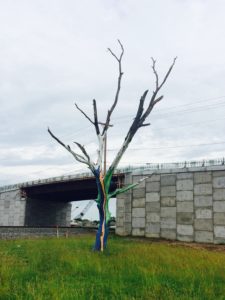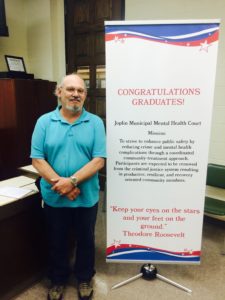Joplin Mental Health Court Helps Participants Find ‘Tools to Move Forward’
 If you look down on the city of Joplin, Missouri, from the top of the hill on West Thirtieth Street, you can trace the path of the tornado that took 162 lives and destroyed vast swaths of the city in 2011.
If you look down on the city of Joplin, Missouri, from the top of the hill on West Thirtieth Street, you can trace the path of the tornado that took 162 lives and destroyed vast swaths of the city in 2011.
The empty lot where St. John’s Hospital used to stand is still scattered with mounds of raw earth, and the few trees that are left in the area bear the scars of the storm’s 200-mile-per-hour winds.
But elsewhere, the resilience of the community is apparent. The brand-new Joplin High School—built on the footprint of the old campus that was destroyed—stretches for acres. New residential hubs have cropped up across the city, vibrant murals have been erected in the town’s commercial district, and many of the gnarled, leafless trees have been painted with bright colors, standing as monuments to what the city has overcome.
Along the gravel road that leads to the top of West Thirtieth Street are Cedar Hill and Magnolia Heights—two supervised, living centers where people with mental illnesses are also learning what it means to rebuild their lives.
“They’re here and they need our help now.”
Cedar Hill and Magnolia Heights are home to several of the 19 participants in Joplin’s Municipal Mental Health Court—a program funded by a 2014 Justice and Mental Health Collaboration Program grant and established through a partnership between the Joplin City Jail and the Ozark Center, the area’s largest behavioral health care provider. The program provides a specialized court docket for people with mental illnesses in an effort to divert them from further criminal justice system involvement.
After the tornado destroyed much of Joplin’s transitional and low-income housing developments, the city’s homeless population burgeoned, as did the number of people with untreated mental illnesses who were arrested for misdemeanors related to homelessness, prompting Joplin’s interest in establishing a diversionary court.
Since the mental health court was implemented, everyone who is booked into the Joplin City Jail is given a brief mental health screen, a process that Jail Administrator Shane Dotson said was unprecedented in Joplin prior to the establishment of the mental health court program.
“Before, a person we booked into the jail would’ve had to display signs of a mental illness while in custody for staff to screen them,” Dotson said. “But we realized that process was backward, and we’d be able to help so many more people if we started being proactive from the minute someone walks in the door.”
Based on the results of that initial screen, Dotson refers potential mental health court candidates—people charged with misdemeanors who have a severe and persistent mental illness—to the public defender and the prosecutor, who then discuss candidates’ charges and their eligibility for the program. From there, the public defender asks candidates if they’re interested in the program, and interested candidates are referred to the Ozark Center for a more in-depth mental health assessment. At their bimonthly meeting, the mental health court team—comprising the jail administrator, judge, prosecutor, defense attorney, case managers, and court coordinator—discuss the candidates and decide whether to accept them into the program. Depending on their charges and the housing options they have available to them, the candidates either remain in the jail or are released while awaiting confirmation on their acceptance into the program.
“Getting all the decision makers at the same table to agree that our priority is to help these people is so key,” said Stephanie Coffey-Miller, Joplin’s mental health court coordinator. “All of the court team members bring a different perspective, and having the space to discuss our perspectives is part of fostering a strong partnership.”
Those who are accepted into the mental health court program receive one-on-one case management from an Ozark Center counselor. These case managers stay engaged in every aspect of their clients’ rehabilitation through Ozark’s programs and resources, including the housing provided at Cedar Hill and Magnolia Heights; INSPIRE, a psychosocial rehabilitation program focused on building independent living skills; Healthcare Home, an integrated approach to helping clients manage all aspects of their physical and mental health; and TEAM Employment, a program focused on helping clients secure stable jobs.
“Every client’s needs are different, but each of those needs is part of a bigger picture,” said Christeny Brown, an Ozark case manager. “If they need their ID or Social Security card, we help them get it. If they need housing, we help them make those appointments. If they need a ride to an appointment, we’re there. It’s about giving support at every level.”
The mental health court program takes between 12 and 18 months to complete, during which time participants are expected to attend every court session, which occur twice a month. During these court sessions, Judge John Podleski goes through the entire docket and each participant discusses his or her progress so that the group learns from the successes and missteps of their peers.
Participants move through four different program phases associated with various milestones related to their treatment and rehabilitation, including securing housing and employment. If they stay on track, on their last court date, they’re able to walk out the doors of the Joplin Police Department without a record.
For Kevin Walker, who supervises the team of Ozark case managers, the program is much more impactful at the municipal court level, where mental health court participants are most often charged with misdemeanors like trespassing and disorderly conduct, than at the county court level.
“These situations are acute,” he said. “Each one of these participants comes before the judge for the first time in their jail uniform and their shackles. Most are homeless.. They’re here and they need our help now.”
“You don’t meet a stranger in Joplin anymore.”
When Michael Banks (pictured below) stood in front of Judge Podleski in his jail uniform and shackles on May 27, 2015, it was far from his first time. He’d stood in the same spot half a dozen times to face various misdemeanor charges over the years.
“My marriage failed and I started living in my car,” Banks said. “I just never thought I’d be doing that. I was depressed and I didn’t know how I was going to make it. Then I started having run-ins with the law.”
The brief mental health screen he received during booking into the Joplin City Jail, as well as subsequent mental health assessments at Ozark, determined that Banks was bipolar, a disorder for which he had never received treatment.
Public defender John Blend saw the newly created Joplin Municipal Mental Health Court as a way to help Banks break his cycle of arrest and homelessness. Banks became one of the program’s first participants.
“With Michael, the first step was finding him housing,” said Desarae Loya, Michael’s case manager. “He’d been banned from some of the local shelters for 30 days because he’d been utilizing them so much and he wasn’t following the rules. But we got him on track, got him to comply with his medication, got him employment. From there, he just blossomed in the program.”
As he advanced through the program, Banks reconnected with his family and was introduced to his 10-month-old grandson. He made a down payment on an empty plot of land in Kansas, where he plans to build a cabin as his home. And on June 1, 2016, Banks became the first participant to graduate from the Joplin Municipal Mental Health Court Program.
“You have to put forth the effort to get better yourself, or else it just won’t work,” Banks said. “[The court team] can give you all the help in the world, but if you’re not going to do anything yourself, then it’s pointless.”
Even after his graduation, Banks plans to stay engaged in services at the Ozark Center, and hopes to mentor other program participants.
“My father used to tell me, ‘If you have the tools, use them,’” Banks said. “My tools to move forward are the ones I learned here. I want to help other people learn those, too.”
For court coordinator Coffey-Miller, Banks’ story, and the stories of all the mental health court participants, lend themselves to the narrative of Joplin as a place where second chances are not only possible, but part of a city-wide identity.
“In some way, the tornado might have been one of the best things that happened to Joplin,” she said. “After all of the destruction and grief, it brought us all together. You don’t meet a stranger in Joplin anymore.”
The sharp rise in school shootings over the past 25 years has led school officials across the U.S.…
Read MoreA three-digit crisis line, 988, launched two years ago to supplement—not necessarily replace—911. Calling 988 simplifies access to…
Read More Taking the HEAT Out of Campus Crises: A Proactive Approach to College Safety
Taking the HEAT Out of Campus Crises: A Proactive Approach to College Safety
The sharp rise in school shootings over the past 25 years has…
Read More From 911 to 988: Salt Lake City’s Innovative Dispatch Diversion Program Gives More Crisis Options
From 911 to 988: Salt Lake City’s Innovative Dispatch Diversion Program Gives More Crisis Options
A three-digit crisis line, 988, launched two years ago to supplement—not necessarily…
Read More Matching Care to Need: 5 Facts on How to Improve Behavioral Health Crisis Response
Matching Care to Need: 5 Facts on How to Improve Behavioral Health Crisis Response
It would hardly be controversial to expect an ambulance to arrive if…
Read More Finding Solutions to Complex Criminal Justice Issues: Q&A with New CSG Justice Center Advisory Board Member Justice Briana Zamora
Finding Solutions to Complex Criminal Justice Issues: Q&A with New CSG Justice Center Advisory Board Member Justice Briana Zamora
The CSG Justice Center Advisory Board establishes the policy and project priorities…
Read More










